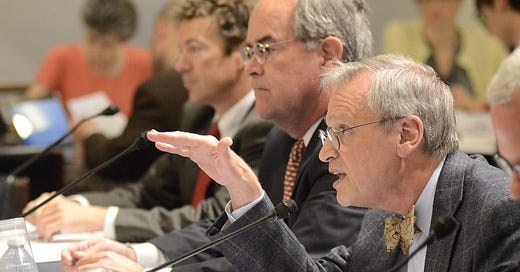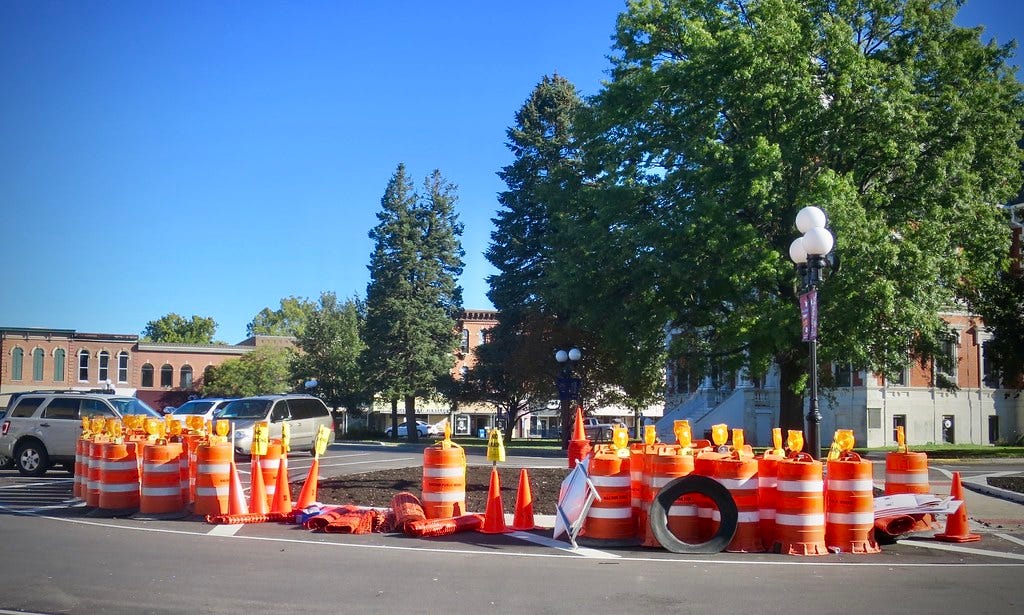The Liftoff: Who's running for what?
Plus: A Portland rundown, how the GOP is feeling about 2022, Blumenauer gets a bridge, COVID-19 still dominates, and an exclusive interview with the Portland Police Bureau.
Welcome back to The Liftoff!
In some personal news, I (this is Ben Bowman writing—not Kevin or Alex!) announced last week that I’m running for the Oregon State House. You can read about that in Willamette Week or the Oregon Capital Chronicle. I am really excited about this opportunity and I see it as another way to contribute to the goals of this platform.
So, what does that mean for this newsletter? We will keep bringing you the most important news each week on Oregon politics, government, campaigns, and elections. Expect to see more content from Alex, Kevin, and guest contributions from new voices (that could be you!). As always, if you’ve got news or perspective to share, we welcome it!
Thanks again for reading, now let’s jump into the news of the week.
1. Oregon360 Media officially launches
Oregon 360 Media is in business!
Here We Go: The Liftoff (this newsletter), The Oregon Way (the platform for opinions), and The Oregon Bridge (our podcast) are combining under the umbrella of Oregon 360 Media to bring you some of the most interesting content from leading voices across the state.
What to Expect: The Lift Off every Monday, The Bridge Podcast every Wednesday, and The Way every Friday (same as our current schedule).
These products are meant to contribute to the revitalization of Oregon’s civic culture (which we believe is under extreme distress) through dialogue, shared information, and community building.
In the future, we’ll be rolling out new products such as 360 Conservations (interviews and moderated panel discussions), in-person subscriber-only events, and other products.
If you want to support our work, please consider subscribing for just $10/month—and asking your friends to subscribe too. This is a people-powered platform and we can’t do it without you.
To learn more about the re-brand and the future of Oregon360, check out our recent podcast episode: listen on Apple, Spotify, Audible, or YouTube.
2. Portland rundown: Thorns’ scandal goes national, Wheeler loses more staff, and traffic cones in the headlines
The Thorn’s, one of Portland’s most popular sports teams, is reeling after an explosive report from The Athletic that accuses former coach Paul Riley of sexually harassing and abusing two former players of the team.
The two former players, Mana Shim and Sinead Farrelly, came forward with the allegations and the story has quickly enraged soccer fans from across the nation.
Shortly after the allegations were known internally, Riley was let go—but he was quickly hired by another team and continued in the league.
Why that was allowed to happen has the Thorns’ management team, led by Merritt Paulson (the son of former US Treasury Secretary Hank Paulson), under intense scrutiny.
Rachel Bachman at the Wall Street Journal has a deep dive into the aftermath: “Abuse Scandal Rocks Portland, the Epicenter of Women’s Soccer.”
More Troubles In Portland: From Shane Kavanaugh at The O: “Portland Mayor Ted Wheeler loses 3 more senior staff, including new public safety adviser after only a month”
This new loss of staff comes less than 2 months after Wheeler lost his Communications Director, who was on staff for less than a week.
Wheeler also faced another round of departures in June.
Portland has a new approach to stopping high-speed shootings – traffic cones. That’s right: “City Commissioner Jo Ann Hardesty has ordered the Portland Bureau of Transportation to install barrels in the Mt. Scott-Arleta neighborhood,” according to Zane Sparling who has the story for Portland Tribune.
This unique strategy comes as Portland has experienced near record high numbers of shootings and homicides in the past year.
Charles Lehman at the Manhattan Institute, a conservative public policy research organization, tells The Liftoff that, “On net, my prediction would be that these will have at best a small deterrent effect, probably one indistinguishable from no effect in any analysis.”
3. Campaign updates: Who is running for what?
According to reporting from Rachel Monahan at Willamette Week, Speaker Tina Kotek will remain in her role through the 2022 short session; Rep. Janelle Bynum has already announced she’s running to replace her.
Hillary Borrud of The O reports that Rep. Andrea Salinas is planning to run in the new 6th Congressional District. Former Multnomah County Commissioner Loretta Smith has also announced she’s running for the seat.
Three’s a crowd: Multnomah County Commissioner Lori Stegmann joins her colleagues Jessica Vega Pederson and Sharon Meieran in running for Multnomah County Chair.
The Oregon Capital Chronicle is out with some excellent reporting on the early stages of the Governor’s race and what to expect moving forward.
Ballot initiative watch: “Proponents push ‘everyday’ Oregonians as a better redistricting approach” from OPB
4. Blumenauer gets a bridge
From Mike Rogoway’s piece in The O on the new Blumenauer Bridge, set to open next summer: “The weather was mediocre. The pace, methodical. But for a small group of Portland cycling enthusiasts, Saturday was cause for celebration. A couple dozen, including U.S. Rep. Earl Blumenauer, gathered in Northeast Portland to await the six-hour installation of a new, $13.7 million pedestrian and bike bridge providing a new route over Interstate 84.”
5. How Republican insiders feel heading into 2022
This section was written by Alex Titus. Alex served in the Trump Administration and spent years working for conservative political groups. He now lives in Oregon.
2022 has several factors pointing to a big election year for the GOP. President Joe Biden's approval rating has tanked to his lowest levels, inflation is accelerating, and the crisis on the southern border is ongoing.
Americans also generally don't like to give the president they just elected two years prior a win in Congress. With apologies to our Democratic readers, 2022 has many of the makings of a red wave—potentially on par with historic GOP gains in 2010 and 2014.
But, but, but: the Red Wave always seems to bypass Oregon. In 2010, Republicans weren’t able to pick up any major statewide wins, losing a nail-biter race for the governor’s mansion (with Chris Dudley ahead on election night, but eventually losing his slim lead to Governor John Kitzhaber) and Oregon Dems again held the line in 2014.
The Liftoff spoke to nearly a dozen GOP insiders and campaign veterans to see how they feel heading into 2022. Here's a few themes from those chats.
Redistricting: Republicans are, unsurprisingly, unhappy about how both the legislative and congressional redistricting process played out—but they are split on the actual outcome.
Dru Draper, a GOP campaign veteran speaking in his personal capacity, blasted the congressional maps but also said: “All I know is that elected Republicans would have been put on the endangered species list if Shemia Fagan drew those lines.”
James Ball, co-host of the Rational Republican podcast, noted his amusement with fishermen in Astoria being lumped with the Pearl District.
The GOP’s Current Candidates: Some Republicans are optimistic. Plenty of praise was heaped on the party’s slate of candidates for governor and congress.
GOP insiders were all over the board on their favorite candidates, but here’s a few names that were mentioned: Lori Chavez-DeRemer, Stan Pulliam, Bud Pierce, Bridget Barton, and Alek Skaralatos. Conservative political consultant Reagan Knopp also expressed excitement about the field shaping up for various legislative districts.
One Major Curve Ball: What if Senator Betsy Johnson runs for Governor? Rumors have been circulating for months that Senator Johnson may be planning to run for governor, with some speculating she may run as a Republican. While several GOP insiders are intrigued by Johnson, they also aren’t convinced she’s serious about running as a Republican—running as an Independent seems more likely. One senior GOP official called this “the nightmare scenario.”
Is the Red Wave Finally Coming to Oregon?: “Not exactly” was the unanimous take of GOP insiders we talked to from across the state.
Despite potentially promising conditions in Oregon, the GOP isn’t confident that this year won’t be like any of the others. Nick Prelosky summed up what most of the group is feeling: “We’re more likely to get a ‘Red Tide’ than a ‘Red Wave.’”
My Take: the maps clearly favor Democrats but it could have been a lot worse. However, if (a big if) the maps stay the same, the GOP still has serious pick-up potential at the state and congressional level—but will likely suffer heading into 2024 and 2026 as Oregon’s population grows. The GOP has a lot to be excited about in 2022 if they can focus on rallying around strong candidates and not the infighting that often engulfs the party.
6. Pandemic *still* reverberating across society
Three headlines that demonstrate the stranglehold COVID-19 still has on key aspects of our society:
“Pandemic leaves holes, questions in the newest state reports on schools” — from OPB
“Disrupted supply chains across the state” — from the Oregon Office of Economic Analysis
“Oregon lawmakers urge Gov. Kate Brown to extend eviction protections for renters” — OPB article about Sen. Kayse Jama and Rep. Julie Fahey’s letter to Governor Kate Brown
7. An exclusive interview with the Portland Police Bureau
The rise in crime in Portland has been widely reported. To get more insight, we reached out to the Portland Police Bureau. Check out our exclusive interview brought to you by Alex Titus with Lt. Nathan Sheppard, a 15 year veteran of the force.
AT: Let's get right into it: Portland has seen a dramatic and scary uptick in violence in the past year. Shootings and homicides are near all-time highs and some particularly shocking violent incidents have happened in popular parts of town. Can you walk us through what's going on? What are the primary sources of this escalation in violence?
NS: In 2020, PPB warned that getting rid of the Gun Violence Reduction Team (GVRT) would have an immediate negative impact on gun violence (as it had in other cities). GVRT was then eliminated in July 2020. Other factors include: PPB's critical staffing shortage, lack of any proactive policing, lack of community support, significant adverse legal rulings, increased tolerance of large homeless encampments, decriminalized narcotics laws are just a few of the reasons.
AT: Surveys from the Portland Police Association point to low morale across the force. Dozens of officers recently resigned from the Rapid Response Team and members of the Portland City Council have taken votes and made statements in support of “defunding” the police. During this time of skyrocketing crime and political tension, what is the bureau doing to increase officer morale and recruit and retain talent?
NS: Employee retention is always a priority, but it is challenging, given that people make the decision to leave for different reasons. Chief Lovell continues to support officers and let them know their wellness is a top priority. PPB is also working with the Mayor’s office on developing a retire/rehire program that would allow some people considering retirement to remain at the Bureau. We also continue to develop a robust Wellness program which can lead to better officer health and better call outcomes (see next question).
AT: Lastly, I want to touch on how increases in crime impact the mental wellbeing of members of the force. Have you seen a rise in incidents of PTSD or general mental health concerns for officers in the last year? How does the bureau respond to officers facing trauma?
NS: PPB has a robust Employee Assistance Program, which includes full (and anonymous) access to counselors, peer support and a Wellness Program. We implemented a wellness program two years ago and have a new directive (policy) regarding how the Bureau's wellness program operates and how members can access it. PPB implemented a restoration project following the civil disturbance events that stretched on for 171 days in 2020. Members who were on the front lines of these events were prioritized and went through two weeks of specialized training.
Heads Up: expect more of these types of concise, smart, informative interviews from The Lift Off in the near future.
8. Get ready for 2022: how partisan are your new districts?
For their subscribers only, The Oregonian has a nifty new map that allows you to enter your address and find out the partisan leanings of your new state house, state senate, and congressional districts. It also provides population size and racial demographic data for both your previous districts and for your new districts.
9. Things are looking up?: Oregonians believe economic conditions are improving
As always, thanks to our friends at the Oregon Values and Beliefs Center for this infographic. The data tells an optimistic story: for the first time in many months, a plurality of Oregonians report that economic conditions in Oregon are “good” or “very good” (45%, up from 30% in April). Those who say conditions are “bad” or “very bad” fell from 68% in April down to 44%.
Thank you for reading.
Tips? Feedback? Ideas? Corrections? We want to hear from you! Email benjaminwbowman@gmail.com.
If you value this newsletter, please become a paying subscriber today. Your support will help us grow and offer more opportunities to this community. It’s just $10 a month!













